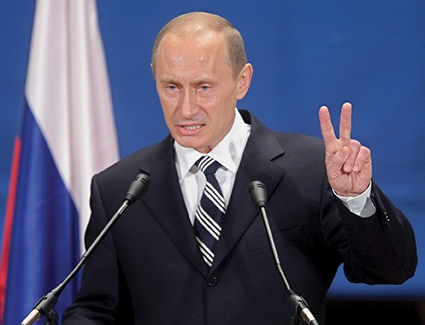The Unsuccessful Rule of Vladimir Putin
Op-Ed
The Russian president’s now already 17-year-long rule has oft been characterized as successful in foreign policy. Under him, Russia still experiences a veritable military resurgence which essentially started with the war with Georgia in 2008, followed by the annexation of Crimea in 2014 and successful entrance of Russian forces into the Syrian quagmire in the Middle East. In addition, Russia has strengthened its military bases across the former Soviet space and created various integration projects such as the Eurasian Union to unite the countries in its neighborhood. Beyond that, Moscow is often seen as playing an important (even successful) role in undermining European unity through cyberattacks, propaganda and corruption schemes.
From the Caucasus to Ukraine and Belarus
But only rarely is the lack of success Russian foreign policy over the last two decades mentioned. By the early 2000s, for instance, Moscow enjoyed pretty much uncontested political and military influence in its neighborhood except for the three Baltic states of Estonia, Lithuania and Latvia. But since Putin came to power, in the South Caucasus Russian foreign policies have led to a deterioration of relations with Tbilisi and particularly after the revolution of 2003 (and coming to power of the overly ambitious Mikheil Saakashvili) that resulted in an open military confrontation. Sure, Moscow built its military bases in Abkhazia and South Ossetia, but the fact is that its southern flank remains to vulnerable, as Tbilisi (although it is still a distant prospect) has been quite successful in moving towards western military and political integration.
Moving to the north-west, to the modern Ukraine, one could easily see how the political landscape dramatically changed and not in Moscow’s favor. Where, before 2014, through Ukraine’s neutrality, the Russian position in the country was well secured both economically and politically - and in case of necessity Moscow could even project its influence to the furthest points of western Ukraine and thus reach the heart of Europe - nowadays Russian control only extends to east Ukraine and parts of the Black Sea through the incorporated Crimea.
Further west in Moldova, too, Russian influence, although it has been somewhat on the rise recently (because of the elected pro-Russian Igor Dodon), has declined. The country once characterized as being openly pro-Russian, has slipped towards becoming pro-European.
Up in the north, in Belarus, Russia still enjoys a predominant position. But even in this often considered as most pro-Russian country, sentiments towards Moscow are not always positive. Paradoxically, the war in east Ukraine and the annexation of Crimea by Moscow, meant to send direct political messages to the countries across the former Soviet space, has led to rather different thinking in Minsk. The president Alexander Lukashenka with his acute understanding of the balance of power in the region, initiated a couple of years ago a policy of rapprochement with the West. The latter has accused him of autocratic rule and regularly imposed sanctions on the country since the 1990s, but over the past two years there have been some positive steps towards lifting some of the sanctions and extending closer economic ties.
Thus, along the entirety of its western border, Russia has either lost direct political influence or is witnessing uncomfortable developments even in the countries it considered its closest allies. Moreover, Moscow’s response to constrain Ukraine’s, Moldova’s and Georgia’s EU/NATO accession plans through fostering and managing breakaway conflicts does not always work. Moscow now has to manage a diverse set of breakaway territories with varied actors and problems.
From the Western Borderlands to Central Asia
Central Asia is perhaps the only region most unperturbed by western encroachment, and Russia does not fear any increase in European and US influence there: geographic distance makes it simply too difficult for western countries to do so. Moreover, Russia is still a predominant military power, with bases in Tajikistan and Kyrgyzstan. But there potential threat is coming from China, as the country has become the Central Asian states’ largest trade partner and source of investment. Beijing even made some steps towards its security involvement through military exercises and even construction of defensive infrastructure on the Tajik-Afghan border. Russian influence will remain a significant force in this region, but it is fascinating how this has diminished over the last two decades.
Thus, along its entire perimeter, from the Baltic to the Black Sea, in South Caucasus and Central Asia, Russia has seen dramatic changes in the political landscape. The countries which were previously at least neutral to Russia military power and bases constitute an important instrument in projecting influence, but in all other aspects direct Russian political influence has diminished. This almost 20-year-perspective of the former Soviet space would, contrary to much-propounded thoughts of current leaders and pundits, confirm further decline of Russian power.
Emil Avdaliani












